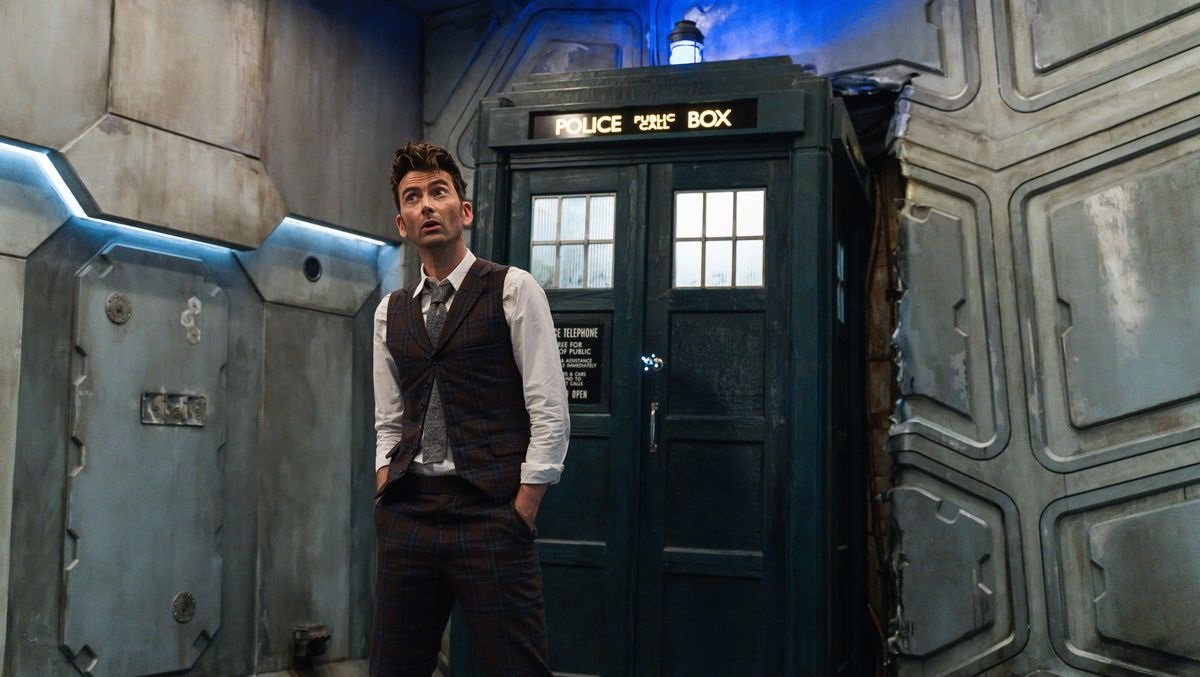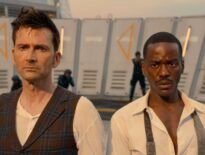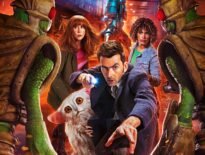Funny thing, Doctor Who. We’re celebrating the 60th anniversary, so it’s perhaps worth pondering again that the format has shown itself to be almost infinitely flexible; moreover, it has to have that flexibility to survive. Tonally, Who has had an enormous range: from a children’s adventure series to a grim, quasi-Quatermass format (okay, I’ve been watching the early Pertwees again); from comedy-drama to a science fiction/horror hybrid. The two specials we’ve seen so far echo one of the most successful periods of 21st Century Who: late RTD1, with David Tennant and Catherine Tate reprising their performances but acknowledging that the characters have developed. It’s similar – but it’s also moved on.
As we only have Tennant and Donna back for three stories, it was a wise decision to make Wild Blue Yonder effectively a two-hander (for most of the episode, at least).
Not all of the companion/Doctor pairings would work in this format; it needs the strongest leads to carry it off. I realise it’s not a view universally shared, but I think Donna’s one of the best realised of all the female leads in the entire 60 years. She doesn’t quite knock Sarah off her perch but she comes very close. It’s good to have her back.
And, of course, good to have David Tennant back too. It’s hard to find anybody who doesn’t like his Doctor – though the Fourteenth Doctor is subtly different from the Tenth. Older, wiser, and perhaps a little more jaded. Less bouncy and less brightly optimistic. A man who carries burdens.
Wild Blue Yonder could be seen as a riff on the base-under-siege format (although it needs a bit of bludgeoning to bash it into that pigeonhole): secure environment infiltrated by hostile aliens. But that format always works well, so who’s complaining?
The aliens were very alien. There was a real sense of otherness about them: unsettling, different, disembodied, drifting on the edge of the void. Doctor Who villains are often pretty straightforward: power-mad nutcases with an inflated sense of their own importance, motivated by a desire to dominate and to blow things up. (And why not?) These two entities, however, were genuinely cruel and disturbing: strip them of their powers, and they’re no more than nasty, spiteful little playground bullies. And superbly realised by the two leading actors. Catherine Tate’s sneer, the horrid teeth (both the prosthetics and the distorted CGI-exaggerated grins), David Tennant’s sophisticated loutishness. Brilliantly done. The way the story was plotted, involving the audience by making them ask what the hell was going on, added to the real sense of menace.

It wasn’t flawless. Some of the CGI for the spaceship wasn’t great. The TARDIS interior is hugely impressive – but is it a bit too sterile, a machine rather than a home? I’m not going to carp, though: RTD is a genuine champion of Doctor Who and it would be churlish to criticise when he’s worked so hard, and beyond the call of duty, to give us so much for the 60th anniversary. Not just the specials, but The Daleks in Colour and persuading the BBC to put that massive archive onto iPlayer. He genuinely cares about the viewers and he’s been enormously generous.
And then we had the final scene and the final appearance of Bernard Cribbins. It would have been wonderful if he’d been able to do more. Cribbins’ association with Who spanned an extraordinary 56 years, from Tom Campbell in the second Cushing film to Wilfred Mott in the Tennant stories. A great actor, an integral part of 1970s childhoods, from The Wombles to his regular slots on Jackanory. (He narrated Terry Nation’s Rebecca’s World on that, too.) His range was extraordinary. He was, of course, a very effective comedy actor (not least in the many Carry On films he did), but he was effortless when realising straight and serious parts. (He excelled as Monsignor Quixote in Radio 4’s dramatisation of the Greene novel.) Wilfred Mott was beautifully played: a totally believable human being, funny, eccentric, warm, compassionate – and capable of steel when confronted by viciousness, whether it came from ill-disciplined British soldiers or from the Daleks.
He was superb and we shall miss him.
Well, Doctor Who’s back. Still pushing the envelope, still innovating, still changing. I marginally preferred The Star Beast but this was still damn good.
(My only problem is that the scene with Isaac Newton contradicted what the Doctor said in The Pirate Planet about how he climbed a tree and dropped an apple on Newton’s head. This continuity conundrum causes me sleepless nights. I must work out how it fits into established canonicity. Only then shall I sleep again.)



